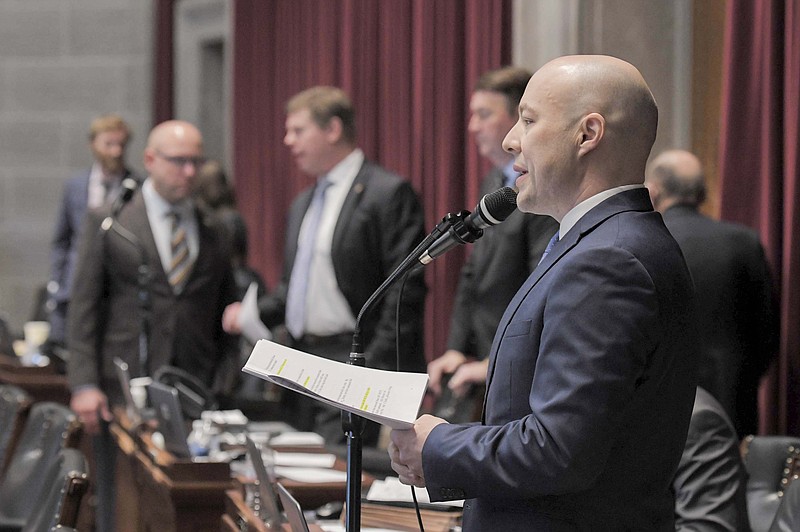JEFFERSON CITY — Gov. Mike Parson signed off on an emergency supplemental budget bill including a state employee wage increase shortly after the Missouri Legislature gave its final approval of the bill Thursday.
The supplemental budget bill will see state workers paid at or above $15 an hour as well as a 5.5 percent cost of living adjustment (COLA). The bill also accounts for wage compression for those employees already making above $15 an hour. Other sections of the bill appropriate funds for education and the state’s Medicaid program.
“We are happy to sign the supplemental budget bill into law today,” Parson said in a statement. “This bill not only gives our dedicated state team members a long overdue pay increase, but also appropriates critical funding to our K-12 schools and child care system. We thank the General Assembly for working to get this important piece of legislation passed and to my desk.”
The Senate passed the measure back to the House on Wednesday evening by a vote of 25-7, and the lower chamber gave its final stamp of approval Thursday morning 133-12.
The House pared the recommendation back earlier this month, passing the $15 an hour minimum for front line workers while relegating the rest of the state workforce to $12 an hour. It was restored to its original funding amount in the Senate and was passed in that form by both chambers.
The only major change from the governor’s proposal on the pay-plan side was the removal of language setting an official minimum wage for the sector, instead funding the $15 an hour baseline without parameters attached. The omission was a compromise between the House and Senate budget leaders, said House Budget Committee Chairman Rep. Cody Smith, R-Carthage, who also sponsored the bill.
“The bill is silent on directing the agencies to attain any particular dollar amount as far as their minimum payment goes, but enables them, through the appropriations process or the numbers, to make the necessary adjustments as needed,” Smith said. “It is not my
intention that the state government should place the state workforce at an unfair competitive advantage over private employers, and I have communicated that to various agencies throughout this process and will continue to do that.”
Lawmakers representing the Jefferson City area have voiced their support for a wage increase for state employees since the governor unveiled his proposal ahead of this year’s legislative session, touting it as a priority before their colleagues and the business community.
“I think every department director recognizes what they need to pay, and this allows flexibility for different parts of the state and for department heads to account for the demands of each job,” said Rep. Rudy Veit, R-Wardsville. “I believe they’ll follow the governor’s recommendation in order to retain their workforce and fill vacancies. This is a solution that has been vetted by everyone, and it’s a compromise that I think will help the state be successful.”
Sen. Mike Bernskoetter had committed to working with budget leaders in the Senate to restore the original recommendation after the House passed its version.
“State workers are underpaid and overworked in most instances, and staff is being lost all over the place,” Bernskoetter has said. “I’ve had to increase salaries in my own business. I can’t imagine being able to hire anyone for $12 an hour, and the state would likely have trouble with that too. I’m going to fight for our state workers to make sure they get the pay that they deserve.”
Bernskoetter could not be reached for comment Thursday.
While other parts of the bill were contentious in the upper chamber, little was said about the pay plan in committee or on the Senate floor.
Around 20 percent of the state’s workforce takes below $15 an hour, according to the Office of Administration.
Jefferson City is home to around 14,000 state employees, making it the largest local employer, according to data from the Jefferson City Area Chamber of Commerce.
The bill also includes funding for K-12 schools. It appropriates $149 million in Elementary and Secondary School Emergency Relief (ESSER) II funds and $1.7 billion from ESSER III from the CARES Act, though the 10 percent ESSER III cut for the Department of Elementary and Secondary Education (DESE) was omitted.
Nearly $100 million was also earmarked for private K-12 schools, with $219 million going toward school nutrition.
It also earmarked money to fund the state’s Medicaid program through the remainder of the fiscal year. That portion drew debate in the Senate on Wednesday evening over a section that would cut appropriations for abortion providers and affiliated organizations, though attempts to alter it were unsuccessful.
The supplemental bill totals more than $4.6 billion in appropriations from various funding sources. The pay plan amounts to $91 million, according to the governor’s office.
Story was updated to include governor's signing of the bill

